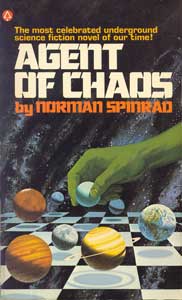Agent of Chaos - Norman Spinrad
 My copy of Agent of Chaos includes an introductory note by Rex Weiner who praises the book for its revolutionary premise and underground status, and explains that it is a cult favorite among prisoners in the U.S. corrections system. I have a hard time believing that this book – firmly rooted in space opera genre conventions and also a dreadfully dull lecture on political philosophy – would be enjoyed by anyone. The 1960s produced so many good revolutionary novels and works of political ideas. Agent of Chaos is not one of them.
My copy of Agent of Chaos includes an introductory note by Rex Weiner who praises the book for its revolutionary premise and underground status, and explains that it is a cult favorite among prisoners in the U.S. corrections system. I have a hard time believing that this book – firmly rooted in space opera genre conventions and also a dreadfully dull lecture on political philosophy – would be enjoyed by anyone. The 1960s produced so many good revolutionary novels and works of political ideas. Agent of Chaos is not one of them.In Agent a central government, the Hegemony of Sol, rules over all human colonies throughout our solar system. The standard of living of the average human in the Hegemony is generally good, sacrificing some individual liberties for stability and harmony. There are two rival organizations: the Democratic League, which seeks to replace the authoritarian Hegemony with a more representative democratic government; and the Brotherhood of Assassins, a shadowy secret group committed to following the teachings in a manuscript describing the role of Chaos in the natural order of the universe. There is a plot about assassinations and interplanetary coups that allows thinly-written characters to engage in pro-forma debates about the benefits of various forms of government. The ratio of lecturing to action in this book is about 10 to 1.
As explicitly stated and restated, these three organizations fall into the three archetypical forms of governance: establishment, loyal opposition, and counter-establishment. The opposition challenges the policies of the establishment government, but supports the general framework of governance. Consider the role of the Democratic Party in the present-day U.S. Republicans control all three branches of government. Democrats form an opposition to the Republican policies, but they are essentially seeking to replace Republicans in positions of power with members of their own party. Politicians of the opposition may use the language of revolution, but they are, in practice, counter-revolutionaries. In the book, the followers of Chaos are not anarchists opposed to any system of governance, but they oppose regularity and predictability. They perform the role of injecting randomness into a system to dislodge it from its evolutionary dead-end. It is ironic that they follow this theory in a disciplined and even religious fashion, but I don’t see evidence that Spinrad intended this irony.
The book is not long, but it continues on long past the point the reader has grasped its facile premise and ceased to care about its cardboard characters and rote plot. Spinrad followed this debut novel with some ground-breaking novels, but none of his later genius is on display here. I was especially reminded of Robert Anton Wilson’s hallucinogenic Illuminatus trilogy, especially in the way the followers of Chaos in Wilson’s series follow a mysterious bible of discord and chaos. Agent lacks any of Illuminatus’s humor, wit, and even the plausibility of that absurd book. Rex Weiner says that this book inspired him to form Pie-Kill Unlimited, that group of jokers who throw meringue pies at powerful people. This book sure could have used some pies.

0 Comments:
Post a Comment
<< Home